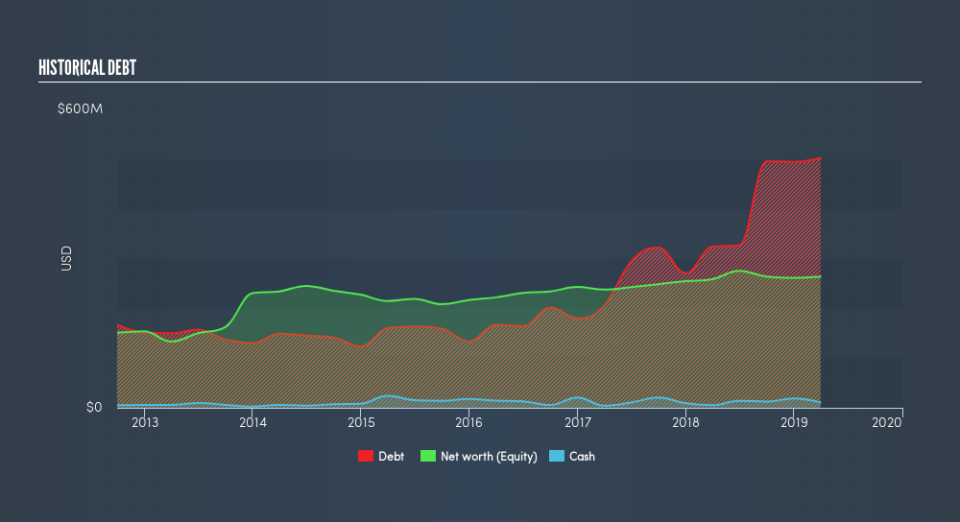Is Intertape Polymer Group (TSE:ITP) Using Too Much Debt?

Warren Buffett famously said, 'Volatility is far from synonymous with risk.' So it seems the smart money knows that debt - which is usually involved in bankruptcies - is a very important factor, when you assess how risky a company is. We can see that Intertape Polymer Group Inc. (TSE:ITP) does use debt in its business. But is this debt a concern to shareholders?
What Risk Does Debt Bring?
Debt and other liabilities become risky for a business when it cannot easily fulfill those obligations, either with free cash flow or by raising capital at an attractive price. Part and parcel of capitalism is the process of 'creative destruction' where failed businesses are mercilessly liquidated by their bankers. However, a more common (but still painful) scenario is that it has to raise new equity capital at a low price, thus permanently diluting shareholders. Of course, debt can be an important tool in businesses, particularly capital heavy businesses. When we examine debt levels, we first consider both cash and debt levels, together.
View our latest analysis for Intertape Polymer Group
What Is Intertape Polymer Group's Debt?
You can click the graphic below for the historical numbers, but it shows that as of March 2019 Intertape Polymer Group had US$538.2m of debt, an increase on US$323.9m, over one year. However, because it has a cash reserve of US$10.9m, its net debt is less, at about US$527.3m.
A Look At Intertape Polymer Group's Liabilities
According to the last reported balance sheet, Intertape Polymer Group had liabilities of US$150.0m due within 12 months, and liabilities of US$636.3m due beyond 12 months. Offsetting this, it had US$10.9m in cash and US$134.2m in receivables that were due within 12 months. So its liabilities total US$641.1m more than the combination of its cash and short-term receivables.
This deficit is considerable relative to its market capitalization of US$799.1m, so it does suggest shareholders should keep an eye on Intertape Polymer Group's use of debt. Should its lenders demand that it shore up the balance sheet, shareholders would likely face severe dilution.
We measure a company's debt load relative to its earnings power by looking at its net debt divided by its earnings before interest, tax, depreciation, and amortization (EBITDA) and by calculating how easily its earnings before interest and tax (EBIT) cover its interest expense (interest cover). Thus we consider debt relative to earnings both with and without depreciation and amortization expenses.
Intertape Polymer Group's debt is 3.6 times its EBITDA, and its EBIT cover its interest expense 4.3 times over. Taken together this implies that, while we wouldn't want to see debt levels rise, we think it can handle its current leverage. On a slightly more positive note, Intertape Polymer Group grew its EBIT at 13% over the last year, further increasing its ability to manage debt. There's no doubt that we learn most about debt from the balance sheet. But ultimately the future profitability of the business will decide if Intertape Polymer Group can strengthen its balance sheet over time. So if you want to see what the professionals think, you might find this free report on analyst profit forecasts to be interesting.
Finally, a business needs free cash flow to pay off debt; accounting profits just don't cut it. So we clearly need to look at whether that EBIT is leading to corresponding free cash flow. In the last three years, Intertape Polymer Group created free cash flow amounting to 20% of its EBIT, an uninspiring performance. That limp level of cash conversion undermines its ability to manage and pay down debt.
Our View
On this analysis Intertape Polymer Group's net debt to EBITDA and conversion of EBIT to free cash flow both make us a little nervous. But the good news is that its solid EBIT growth rate gives us reason for some optimism. Once we consider all the factors above, together, it seems to us that Intertape Polymer Group's debt is making it a bit risky. Some people like that sort of risk, but we're mindful of the potential pitfalls, so we'd probably prefer it carry less debt. In light of our reservations about the company's balance sheet, it seems sensible to check if insiders have been selling shares recently.
If, after all that, you're more interested in a fast growing company with a rock-solid balance sheet, then check out our list of net cash growth stocks without delay.
We aim to bring you long-term focused research analysis driven by fundamental data. Note that our analysis may not factor in the latest price-sensitive company announcements or qualitative material.
If you spot an error that warrants correction, please contact the editor at editorial-team@simplywallst.com. This article by Simply Wall St is general in nature. It does not constitute a recommendation to buy or sell any stock, and does not take account of your objectives, or your financial situation. Simply Wall St has no position in the stocks mentioned. Thank you for reading.

